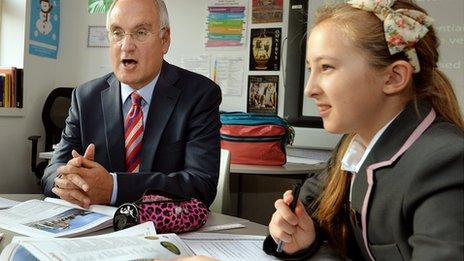Ofsted warns of 'two nations' gap in school standards
- Published
- comments

Ofsted chief Sir Michael Wilshaw wants all regions to match London school standards
The "battle against mediocrity" must be fought to improve school standards across all parts of England, says the head of education watchdog Ofsted.
Launching Ofsted's annual report, chief inspector Sir Michael Wilshaw said the regional gap was like "two nations".
Sir Michael called for more testing, proposing formal tests in English and maths at age seven.
The report showed that eight in 10 schools were now good or better, the highest in Ofsted's history.
But there were still nearly 250,000 pupils being taught in inadequate schools and 1.5 million in schools that require improvement.
Sir Michael raised concerns about the differences in pupil attainment across the country, with London an example of rapid improvement and warnings that areas such as Doncaster, the Isle of Wight, Norfolk and Suffolk were falling behind.
There are now nine authorities where all secondary schools are either outstanding or good - with seven of these in the London area.
Ofsted figures also show that other areas in inner London have a very high proportion of pupils in outstanding or good secondary schools - 99% in Hackney and 98% in Haringey.
'Born in the wrong area'
Sir Michael said there needed to be a fairer distribution of good teachers and school leaders across the country, with incentives to encourage the best teachers to move to the areas of greatest need.
To have a world-class education system, he said "we've got to iron out these regional differences".
He warned that children who are "born in the wrong area" should not have lower expectations in what they can achieve.
He also drew attention to the plight of white working class boys, saying this group was being left behind.
The Ofsted chief also raised concerns about poor behaviour, such as pupils answering back to teachers or "background chatter".
Sir Michael compared this low-level disruption to the classroom discipline of the east Asian school systems, such as Shanghai and Singapore, which dominated last week's international Pisa tests.
In response, Sir Michael said there would be unannounced school inspections to check on classroom behaviour.
He also called for a return to external testing for tests taken at the age of seven.
Ofsted inspectors reported there were "worrying inconsistencies" in teachers' assessments and that an external check would create a more reliable measure of how well young pupils were progressing.
London challenge
One of the areas Ofsted praises for raising attainment is Tower Hamlets in east London.
Di Warne, head of secondary learning and achievement there, said the key to success was working in partnership with other schools and high expectations and support from local politicians.
"One of the biggest things has been our focus on monitoring and tracking the progress of young people and we do that really rigorously," she said.
"I suppose what I would say to them [regions that are struggling] is to raise your aspirations and make your aspirations for your young people really clear and that poverty is no barrier to success and I think that is what London has proved more than anything."
Malcolm Trobe, deputy leader of the ASCL head teachers' union, said the report showed: "Children in England now have the best chance they have ever had of going to a good school."
But Mr Trobe warned that there were challenges to schools improving further, including difficulties in recruiting staff in key subjects such as maths. He called on the government to address the supply of teachers as a "matter of urgency".
Christine Blower, leader of the National Union of Teachers, said that Sir Michael was "quite right to praise the progress of London schools".
She said the success was the result of schools working together and sharing best practice and that it was "political stubbornness" that prevented this model from being replicated across the country.
Labour's Shadow Education Secretary Tristram Hunt said the "postcode lottery" of regional differences needed to be tackled - and he accused the government of weakening rather than improving standards.
"By allowing unqualified teachers into our classrooms and having no strategy for school collaboration," he said the government was "damaging school standards and hurting children's life chances".
A spokeswoman for the Department for Education welcomed the proposal for unannounced inspections on behaviour.
"Ofsted is right to place a high premium on good behaviour. Bad classroom behaviour is hugely disruptive to children's education. It means teachers can't teach and pupils can't learn.
"A robust behaviour policy, properly enforced, is the bedrock of all outstanding schools' success. That is why we have strengthened teachers' powers to put them back in charge of their classrooms and their schools."
The Department for Education said its reforms were already raising standards.
"We have an increasing number of brilliant schools and of outstanding heads and teachers. More and more are working with others to share their expertise to drive improvement in weaker schools. We are especially targeting areas where there are long-term problems, and recruiting new sponsors to turn round poor schools."
- Published11 December 2013
- Published3 December 2013
- Published9 December 2013